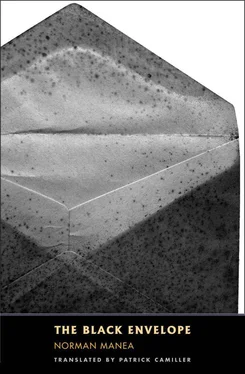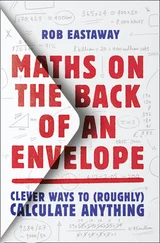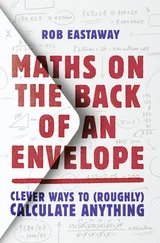“I don’t know. Leave me alone. I’m going anyway. You’re having a bad day, Tolea. It’s bad taste, Tolea. Bad taste, believe me.”
“I believe you, don’t worry. Good taste is what all those ladies have who strut around with their noses in the air. But the dear old boy really was capable of tackling any subject — that’s what I mean. That evening Father received a letter. You know which evening I’m referring to. You knew my people well. Who did Marcu Vancea like most?”
“Your mother.”
“Okay, but we’re not talking about that side of things.”
“You probably.”
“Well, I think it was Sonia. And Mircea Claudiu didn’t get a look in. An ice block, a calculating machine: he belonged to a different species. I’m the only one who knows about the threatening letter. Does that prove that Daddy loved me most? Maybe, if you say so. Is it really likely that I was the only one who knew about the letter? Yes, it is, you must confess. Let’s say it had an emblem above the text. I was a greenhorn, I admit; I had no way of knowing what it meant. A three-headed image, let’s say. Would that have been impossible? No. A man’s head in those three tenses of the verb? Well, then—”
“What is all this? You’re making things up and it’s not funny. Listen, Tolea, Jeny and the stroganoff are waiting for me.”
“You don’t understand a thing! You’ll only understand if you’re forced to. Then you’ll ask me for a consultation, Burschy. I’ll give you one, Burschy, I will.”
Marga went pale. No one knew about that nickname from his teenage years. He hadn’t heard it himself for years. He turned gaping from the door, but Tolea appeared not to notice.
“What do you understand by prudence, Goody-Goody? Is it nothing other than the triple superimposition, which is a mark of submission? Past, present, and future urging you to be cautious? That is, to be wise? Is this wisdom? Praesens prudenter agit ? The allegory of prudence? Memory — that is, the past and intelligence, understanding of the present — leading to this long rigmarole? But what of the project? The presentiment, the future, futura, as the ancients used to say? I’m speaking to a doctor, listen to me! Listen to me, Doctor. You can’t escape these truths!”
They were on the long drive that led up to the hospital gates. The hour of repose: the doctors had left, the patients were resting, the drive was deserted. The buffoon was waving his hands, nodding his bald head, and stamping his hooves to make his words seem more convincing. The fat little doctor was cleaning his glasses, finding it difficult to keep up with the rascal’s nervous steps.
“The lion in the middle: the fierce, dominating present. On the right the cringing dog: the hypocritical smirk of the future, which wants to be liked by everyone, benevolente, benedictinus . On the left the wolf: the past devoured, devouring. The three-headed monster, I tell you, as the Egyptians of the desert and the Nile proposed it! It was the Renaissance, the European Renaissance, yes, our European Renaissance which introduced the snake. Snake, spiral, time. Corpus serpentinum —the three-headed monster acquired a snake’s body. It’s no longer the horror made to scare, no, no. The monster recovers the dimension of reality, at the feet of man. At the feet of man, Goody-Goody! Because the true divinity is yourself, Goody-Goody, vulnerable homo , brought to the center of the sequence, in the image of Apollo. That’s how our Renaissance saw it. Ours, Hippocrates! The European Mediterranean put you, Apollo, at the center of the sequence. You’re Apollo, that’s what you are, Goody-Goody! At your feet the monster recovers its true dimension.”
Dominic did not calm down even in the taxi. The doctor sat in front, beside the swarthy young driver. Tolea was in the back, roaring away.
“Apollo or Christ: it doesn’t matter. We’ve always found ourselves between beauty and creed, knowledge and belief. Athens and Jerusalem, well— Only then was a move made away from that tangled and naïve and exaggerated representation. So don’t forget: those great painters of yours, obsessed with simplifying this image, were Europeans. Titian, Holbein — or the other, Pussy, as he was called, Poussin. Europeans, I tell you. Yes, the barbarians didn’t use the human emblem. They aimed to be children of the monster. Fascinated with the anthropomorphic, coded, hooked, inaccessible image. The superman. Do you remember? The new man of the new times, the songs, the model, the Model Association, the uniforms, the howls, the promises. The rhythm, Herr Doktor, the rhythm. The two-headed three-headed beast, comrades, pam pam, with pomp and triumph, what a fine kettle of fish, tra-la-la.”
The driver’s eyes goggled and his ears dilated. These days you never know whom you’ve got in your taxi; you have to be very careful, all eyes and ears. The cab braked slowly, elegantly, in front of the villa. After such a speech, Mitic˘a will show the gentlemen what the Bucharest drivers’ art really means.
The doctor took out his wallet, but Tolea slapped him protectively on the back.
“Drop it, old boy. I’m paying.”
“Be serious, Professor! You might say it was a consultation. An art lecture — or maybe it was philosophy. I think our friend at the wheel also enjoyed himself.”
“Leave Mr. Bender out of this. I said I’m paying and I will. Otherwise it’s not over: we’ll keep going.”
“What? Aren’t you staying to eat? I would like that very much. Madam Jeny would be delighted. You’re her soft spot.”
“Thanks, but I’m already tied up. I can’t even have a proper argument at your dinner table. The food’s too good: it makes you feel weak and heavy — and bloated, to be quite honest.”
Tolea snatched the money from the driver’s fingers and gave it back to the doctor, who was just getting out of the car with all his baggage: raincoat, shopping bag, briefcase, umbrella.
The professor looked at his watch. “I’m sorry, I really can’t. I’ve got to be back at home. A lady is waiting for me. You’ll give way to that argument, from what I know of you.”
“I will, and I won’t even question it. But it’s a pity. Okay, another time. Shall we say Friday? Call in the evening, or pick me up from the hospital. I see you know the address.”
Tolea bent toward the driver. “To the Hotel Tranzit! You know where? On the Splai—”
The taxi turned around, took the first left back onto the boulevard, did a complete circle of Pache Park, and headed back.
“Ah, so you’re not from Bucharest. You’re staying at the hotel. Just passing through, are you?”
“Well, sure. Just passing through. The great passage. That’s what we’re all doing, my friend. But you’re right, I am from the provinces — of course. Do people in Bucharest really have time to debate such important matters? They don’t seem to: they’re always in a hurry, always showing off! It’s all froth. They haven’t even got time to open a book. Yes, I’m a pure-blooded provincial, like my friends Ilf and Petrov, the doughnut sellers.”
The driver seemed never to have heard the names before, but nothing surprised him after the previous speech. His Bucharest pride would not let him pass it by, however.
“Come on, sir, don’t be that hard on us. I’ve met people here who—”
“Just a glossy surface, I can tell you! All they learn is chit-chat, Mitic˘a. Pinching words from here and there and giving them some spit and polish. But the provinces! That’s where you’ll find real greatness, in the smoldering boredom of provincial life. That’s where the truth is, you know, Mr. Bender. Have you recently been in the main town of any county up in the mountains?”
Читать дальше












